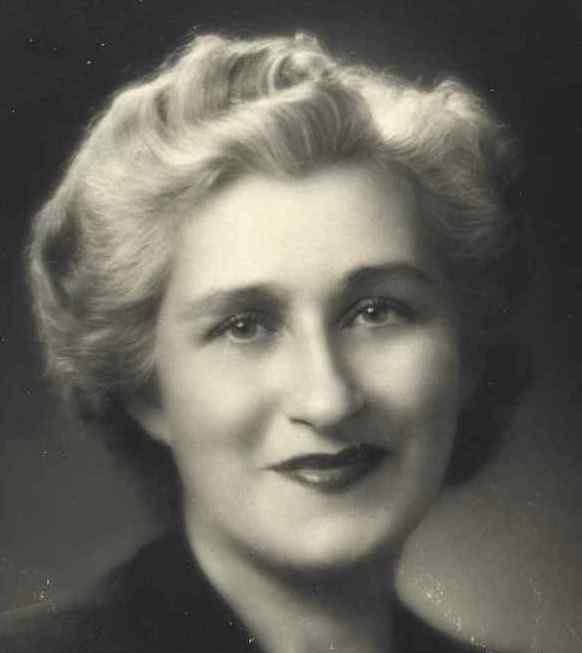
Ethel Miller Katz
SelectRelation to Morton Harvey Epstein ResetThe selected persons are not blood related.Ethel Miller Katz, the mother of
Ellis Robert Katz, the husband of
Marjorie Ruth Blumberg Katz, the daughter of
Louis Eliel Blumberg, the brother of
Alice Blumberg Epstein, the mother of
Morton Harvey Epstein
- Parents: Benjamin Miller and Rosa Felsher Miller
- Siblings: Oscar Charles "Charlie" Miller, Isaac (Ike) A. Miller, Harry Miller, Lena Sylvia Miller Cohen
- Spouses: Robert Ellis Katz
- Children: Ellis Robert Katz and Florence Harriet Katz Liberman
- Gender: female
- Birthplace: Chattanooga, Tennessee
- Deathplace: Los Angeles, California
- Wedding date: 1917-06-03
My Life by Ethel Miller Katz - an autobiography
Oct 1986
As I approach my eighty-eighth birthday and look at my life and its blessings, I so want to leave something priceless to my precious family, but the only legacy I have to leave is this telling of my life's story.
I entered this world as the youngest of five children of my beloved parents: Rose and Ben Miller of Chattanooga, Tennessee — God bless their souls.
They were loving parents; they were both very young when they married. It was a love marriage-not arranged as some were in those days in Europe. My mother, God rest her soul, was a hard-working lady…milking her cow, making sweet butter, and cooking bread over a coal stove.
My father was called “Old Reliable Ben”. He never missed being notified or called when his lodge needed him for a birth, death, or any important occasion. He was a lodge member of Odd Fellows, Knights of Pythias -you name it- he belonged.
His picture framing business was on Cherry St. in Chattanooga. He was such a handsome man and highly respected, but he was not a good businessman, he often gave his wares away. Whenever his brothers, as he called them, needed a frame for graduation or weddings or whatever they would go to “Old Reliable” who invariably would not charge them for his work. He were a kind caring man who was much loved by his community
I had a wonderful childhood in our home on 10th Street, attending school one block away. We had a horse and buggy and a nice large house and were considered an upper-class family. My beloved sister Lena, may she rest in peace, was six years older than I, and we had three wonderful brothers: Charlie, Ike, and Harry.
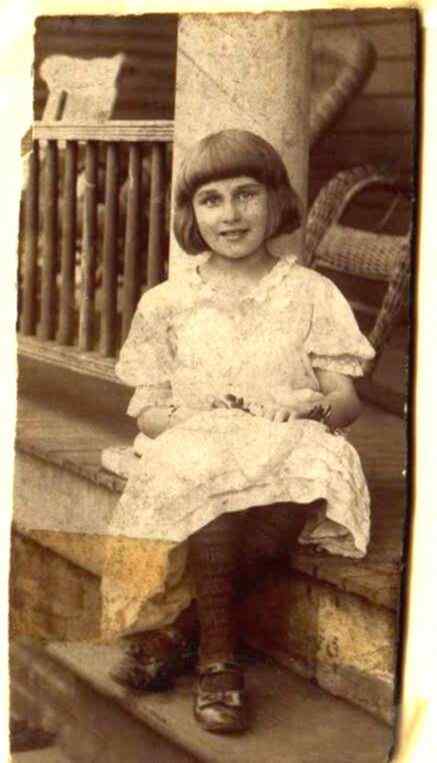
Ethel Miller Katz as a girl, on the front steps of her 10th Street home in Chattanooga
I don't remember having birthday parties but I do recall, when I was about eight years old, winning two tickets to the Bijou Theater in Chattanooga. I was always good at essay and words and my essay was drawn for the prize.
My brothers had to sell newspapers, and it used to break my mother's heart to have to awaken them early in the morning for their work. But in spite of that, and little schooling, my three brothers become very successful prominent men.
My oldest brother, Charlie, became a Hearst executive. My middle brother, Ike, left for N.Y. with a diamond stud but, before long, he was broke and had to wire home for help. However, he got a job with a clothing manufacturer and was so good that, in just a few years, he founded I. Miller & Sons. He made a fortune and bought an estate next to Irving Berlin [the composer] in the county. Florence and I visited there while in N.Y. many years ago. That was his summer retreat; in town he lived in a luxurious apartment on West End Ave. He had five sons and one daughter. He was very handsome as were all my family.
My youngest brother, Harry, bless his soul, was so good to me. He opened a very swank dress shop on Market St. in Chattanooga. Later he sold it for one million dollars and offered his services to the army during the Second World War. He became a dollar-a-year man at the Pentagon with the rank of colonel. He passed away at 75 years of age but he left me a legacy in my precious niece, Eleanor, who is so dear to me.
My sister and I were considered belles of Chattanooga. Our lovely home had a charming porch where we enjoyed a swing on the side and where many young men we dated used to spend pleasant hours. My parents, and especially my brother Harry, utterly disapproved of Phil Angel, long deceased, who had hoped to marry me. He had a printing press in his home and that was his means of income.
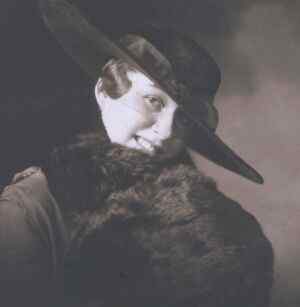
Ethel Miller - a beauty
At the age of sixteen I was infatuated with a handsome young man, Henry Randle, and thought I would marry him-but threw him over when I met your Dad who swept me off my feet. When I met and dated your Dad, all of my boy friends became resentful.
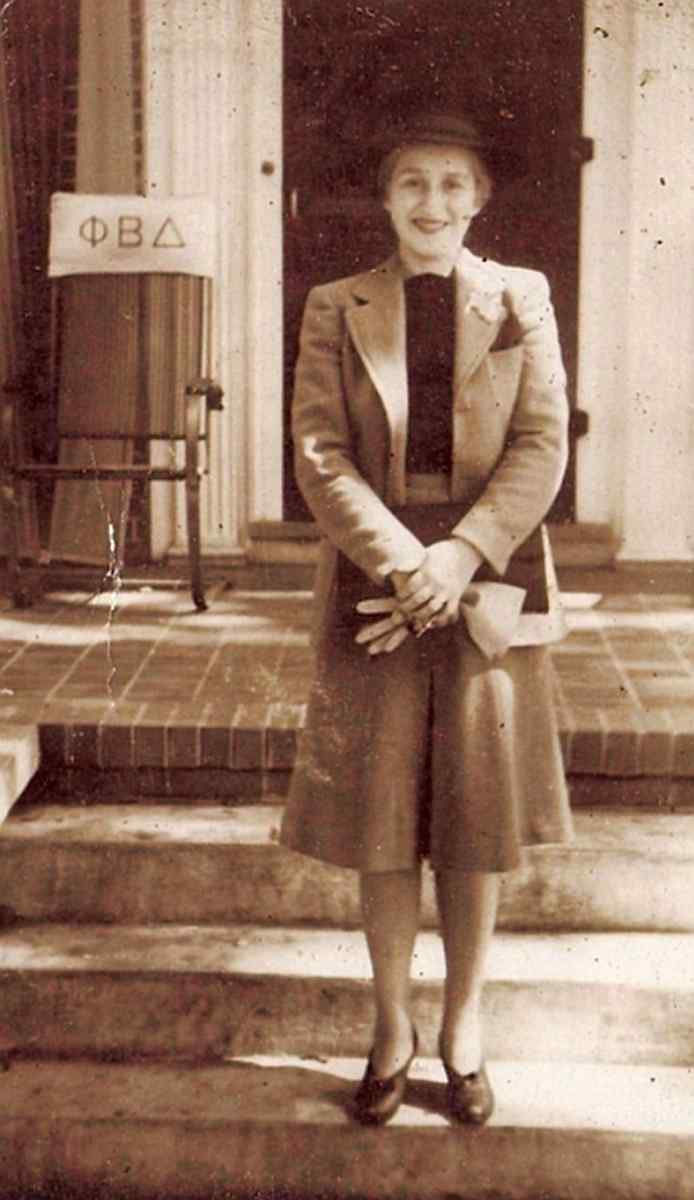
Ethel
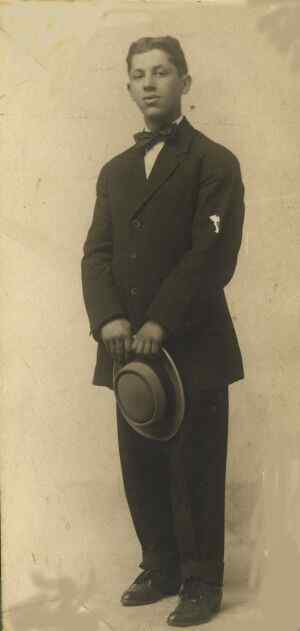
Robert Katz
As a matter of fact, one summer we had visitors and I was dated up all week for different affairs: dances at
Warner Park and at East Lake Country Club.
The boys who were supposed to accompany me were so resentful of the dashing young dude, your father, who wore
celluloid collars and white spats that they stood me up. Your Dad, bless his memory, had an idea they would
stand me up, so he called from Dalton and, when he learned of my distress, returned to Chattanooga. The evening
of the dance that I was supposed to have attended with Ben Block, Ben arrived early and told the hostess that I
had a cold—-But when I arrived later with Dad-was Ben's face red! He and Phil Angel, his best friend, tried to
apologize but I told them off in no uncertain terms. Your Dad wined and dined me for several days thereafter.
I realized he was my true love and we made plans to be married and were engaged Christmas of 1916 and were married June 3, 1917. I had started dating at fifteen and married your Father at seventeen. I made a wise decision, which I never regretted, and enjoyed almost sixty happy, though sometimes hard, years with the love of my life. As I sit here on his Yahrzeit, I am naturally blue and sad at losing him-though I really feel that he was tired and didn't want to live.
Our marriage was not a slacker marriage, but, in spite of everything I could do, he was drafted. Our rabbi, Julian Miller suggested I go to Nashville where we urged the governor to arrange a meeting with the attorney general. Although the attorney general listened to my plea that our marriage was arranged before the war, it was to no avail and my husband was drafted in 1918. He was stationed in Columbia S.C. for a short time before leaving for Europe. I followed him, but in only six weeks he was sent overseas with no experience at all. I felt that if he were a third-degree Mason he might be treated more favorably in the service. However, he had only completed the first two degrees, and so I called Jake Levine in Chattanooga to see if he couldn't hurry Dad through the third degree-which he did just a few days before shipping out for Europe. Fortunately, his commanding officer in Europe was also a Mason and did keep Dad from having to go to the front, and thank God he came home safely to me.
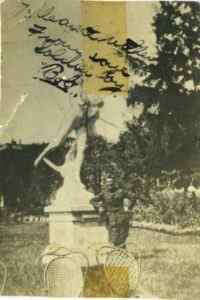
Robert Katz in France
After Dad was sent to Europe, my dear mother wanted to lift my morale so she used to have soldiers over for Sunday dinners. I introduced some of them to some to my less-popular girl friends who were later to be married as a result. One soldier, Dr. Harry Wronkle, married Ida Brody; and a fine gentleman, Dr. Eddie Selzer, later married Minnic Sacks. While living with my parents, I was very friendly with three girls: Rose Finklestein, Nellie Canter, and Hannah Goldstein. We met for bridge one day each week.
During his service in Europe, I also spent a few months in Fort Worth, Texas and commuted to Dallas where I sold war bonds. Before returning home to my parents in Chattanooga I spent several weeks with Lottie Lowenberg while her husband Ira was traveling. Lottie was pregnant and pleaded with me to stay with her and await her baby's birth, which I did.
God was good and saved my beloved husband and, when the Armistice was declared on 11 November 1919, we had a wonderful reunion at Chickamonga where he was released from service. The following year we wanted a child but I could not conceive. My doctor suggested surgery and happily, 2 years later, we were blessed with our beautiful baby son, Ellis. We had by then moved to Atlanta, Ga. I wanted to follow my husband as he traveled the west coast and so we decided to move to Chicago, which was near the center of his territory. We moved so many times, but our move to Chicago was a happy move since we could see Dad more often as he traveled the west.
In Chicago we had a nice apartment in back of Roger Park Hotel on the lake. You Ellis were a baby, and when Florence was conceived, we knew it would be difficult with two babies in freezing Chicago. So by 1923 we had returned to Chattanooga where we were blessed with a beautiful baby girl, Florence. My beloved mother turned her tiny apartment upside down to make room for us as we could not afford our own place with two babies on $35 a week.
Later, Dad was offered a job with Panther Rubber Co. in Boston so again we packed up and moved to Providence. While we were happy there, we thought it best to return to Atlanta, as it was difficult with two babies. While we were packing to return, our German maid pulled everything out of the cabinets and placed a bottle of bleach on the shelf. I left Ellis to say goodbye to a neighbor-and Ellis, thinking the bottle was water, took a drink of the bleach. Dad saw him choking so, to understand what was happening to Ellis, he took a drink from the same bottle. Dad then understood that Ellis could not possibly have swallowed the bleach. That very evening Dad and I kept looking in on Ellis all night to see that he was safe…thank God, he was safe.
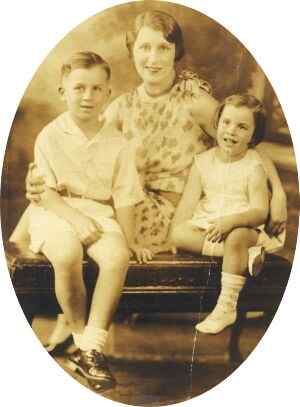
Ethel Katz with her children
By 1926, Dad's family included my sister, Florence, and me. Dad was doing well and his family was then living in Providence, RI.
Years later when our children were older we moved to Jacksonville, Fla where Ellis received his engineering degree from the University of Florida in Gainesville. Florence was still in high school and I, with no experience, went to work at Purcell's, an upscale lady's dress shop, to help our son remain in college. By this time, 1942, the second war was on and we moved back to Atlanta where my husband joined with our brother-in-law, Ben Cohen, to manage a busy concession in the Terminal Station.
After graduating, Ellis also returned to Atlanta where he took a job at Bell Aircraft. Florence worked at Railway Express in Atlanta. I was always proud of her as she always got the first job she went for. I remember meeting Florence for lunch and going to the blood bank where we both contributed one gallon of blood for which we were given the commendation of being the only mother-daughter team; we still have the certificates. Ellis worked at Bell bomber nights and we often would go to the Progressive Club in the afternoons to swim.
We had a run-down apartment on Highland Ave., which I made livable. Rent control was still on but we could afford no better; but we were happy and had a darling little dog, Blackie, who gave us so much pleasure. My mother moved in with my sister and her husband at the Briarcliff Hotel after my father's death. However, since my sister's only child, Mildred, was married, living in Charleston, S.C., they left Atlanta, and my mother came to live with us.
I think I am ahead of my story but Ellis was offered a job at Langley Field, Va. where he met and married his dear wife, Margie. They were married in Chattanooga where our family and Margie's family have much in common. In the interim, Florence met and married Martin who had returned from service in Japan. Since we wanted to meet his family, we three drove to Seattle, Wash. where they were married.
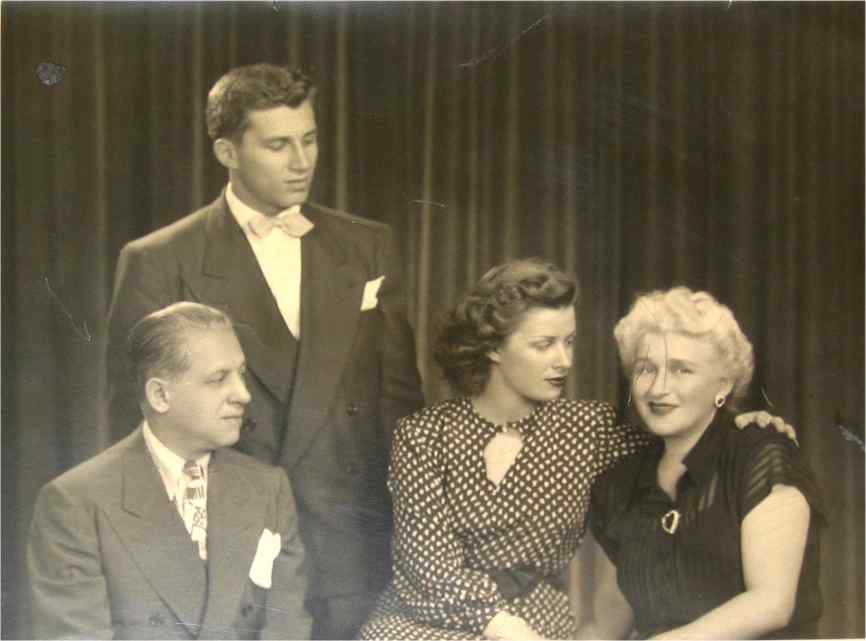
family pic
This portrait was taken in Atlanta 1945 just prior to the marriages of their children
In 1946, with both our children married, we wanted to live our own lives so, with my mother, we moved to Miami Beach where my husband started a successful chemical supply company. Dad had made some money at the Terminal Station in Atlanta with Uncle Ben and he wanted to go into some business. Dad knew the chemical- business and he met a fine young man, Milton Margolis, from Philadelphia who also had some money to invest. So they teamed up and opened the AIan Chemical Co in Miami.
His company was named “ALAN' to honor his first grandson Alan, by Florence. It flowered very well as they were both salesmen. However, after grandmother passed away, may she rest in peace, we felt that we wanted to be near Florence in Seattle, so Dad sold his half in the business. Dad's partner was so very sorry to see him leave the business and even offered to work Dad's territory as well and send him a weekly allowance. So, in 1950 we moved to the west coast, Los Angeles. By that time Florence and Martin had moved to LA and Margie and Ellis had our second grandson, Ron. Although our roots were centered in the east- after the death of my dearest mother, rest her soul, we settled in the west and, though it was a costly move, it turned out to be a happy one-to be near our children and their families.
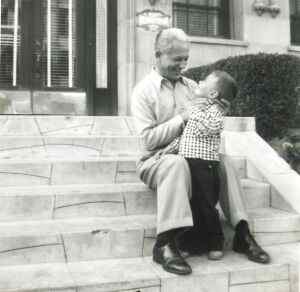
with alan
Here is Dad with his first-born grandchild, Florence's son, Alan. He was very proud of his four grandsons: Alan, Ron, Dan and Paul.
In 1955 Ellis and Margie, with Ron and infant son, Dan, moved to California where North American had offered him a job. North American ultimately became Rockwell International where he continues to be happily employed. Florence was offered a position at Rockwell from which, after many happy years, she only recently retired.
Alan married Susie Friedman and they live in Santa Ana with their three beautiful children. Ron married Susan Goodman of Memphis and they have my other two beautiful great grandchildren. Dan married Michelle Margolin and they live in their lovely new home in Simi Valley. Paul, the youngest of my grandsons, has recently passed the bar and is a practicing attorney.
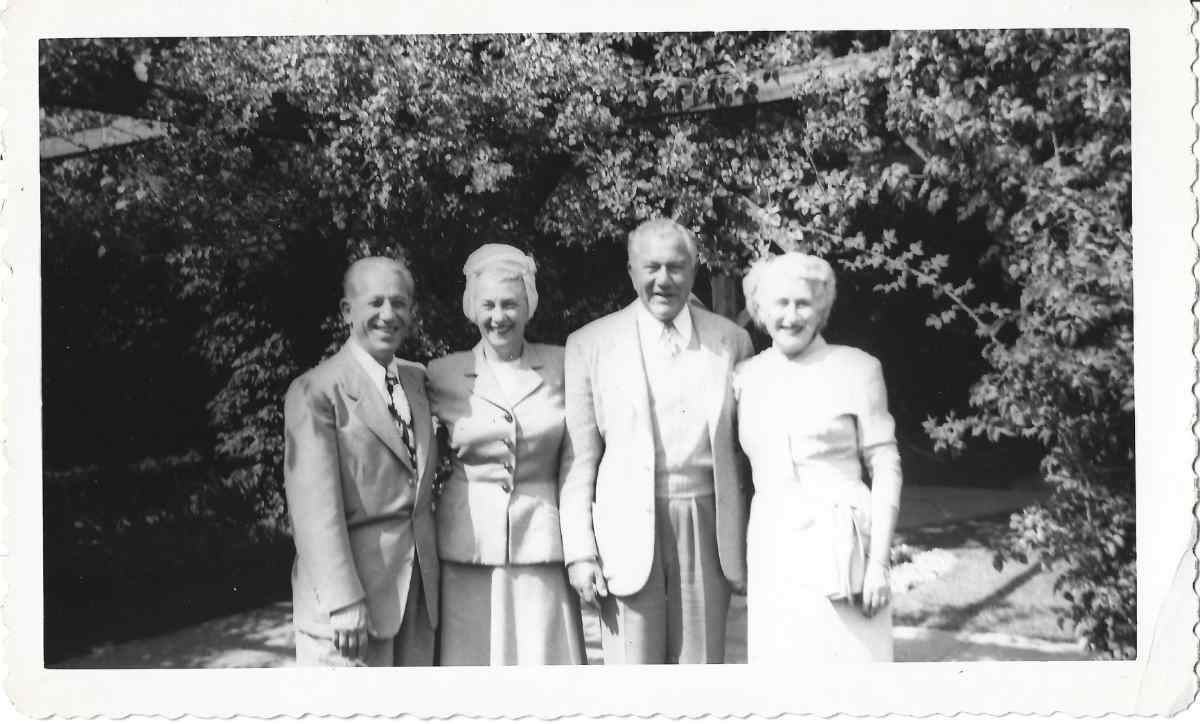
Robert and Ethel in August of 1949
Dad and I had hectic, but also many happy times; we somehow weathered the storms. Dad took a management position at a ladies apparel shop and I worked at Orbach's for 18 years to help out with our financial bills. I enjoyed working from 1950 through 1967 at Orbach's, though at first, it was from financial necessity, I became one of the best known personalities at Orbach's and was always admired and respected by my manager and peers.
We had a lovely apartment on 1055 S. Orange Grove Ave; it was the only place we stayed twelve years. I had many nice neighbors and it was so cheerful. I recall the many times Ellis used to come over to have dinner with us. After having some wine and appetizers we used to say, “let's go for the chili” which Ellis still loves and I enjoy making. Our apartment on 1055 was the most enjoyable we had in L.A. However, we also had good times when we lived on 607 S. Dunsmuir having Margie, Ellis, and Ronnie visit us.
Our wants were simple: spending a few days in Vegas, then enjoying a few days in Palm Springs during my vacation. Then, of course, our beautiful memorable golden anniversary in 1967: after 50 years of happiness, Ellis and Margie gave us an anniversary party at the Beverly Hills Hotel and Florence and Martin gave us a much enjoyed color TV set. Later, our joys at being able to walk down the aisle at Susie and Alan's wedding.
We enjoyed brunch with our two grandsons and their wives at 1055 S. Orange Grove Ave; we were so proud and happy with them. We enjoyed many happy New Year's Eve's with Ellis and Margie. We felt happy to be able to baby-sit and particularly, when we went to Whittler to await Margie's giving birth to our dear Paul. Also the times we enjoyed having Alan with us as a child. Parents and Roots are so happy to be needed.
Unfortunately, Dad had developed diabetes and left us very sadly in 1976. His death left me helpless and the children decided I should not live alone and broke up my beautiful apartment of 18 years on 1055 S, Orange Grove Ave. I had many accidents and, after being hospitalized, they placed me in a retirement hotel, the Shalom on Hayworth, where I was miserable. I moved to many different institutions after suffering many falls and accidents. They were probably the result of my mental condition, as I really wanted to join your Dad. I knew I could find no contentment other than having my own apartment. I was lucky enough to find my present apartment in which I enjoy cooking and eating when I want and what I want. They now realize it was for the best and they show concern for me and come to see me as often as possible. My life, though sad at losing Dad, is content. During our years of marriage we made many moves: Chattanooga, Atlanta, Chicago, Providence, Philadelphia, Miami, Jacksonville, Seattle, and Los Angeles.
Since 1976 when my darling husband, bless his soul, left me I have had other great losses. My beloved sister whom I had not seen for several years died in 1977 and Mildred, her only child, who was very dear to me, died in 1978. But I feel blessed with my wonderful children, grandchildren, and great-grandchildren who are very considerate of me. My income is very small; though the children assure me they will help if needed-but I would rather give than receive. I have a wonderful niece, Eleanor, in Chattanooga and two wonderful more than friends, Reverend and Mary Jane Ulbink who visit me every week
I recall many happy times we had together-our special days with picnics in the park and in our patio. Also I remember the wonderful times we spent at the Hollywood Bowl with Margie and Ellis and, sometimes, the boys. Also the many good times and fun spent on Fridays with Florence and Alan. After dropping off Dad at the shop on Slauson, I would drive back to see Florence and we would go shopping in North Hollywood for several hours; after which I would pick up Dad. Florence and I have both had rough times but we had many happy times and lots of laughs. We so enjoyed Palm Springs where Margie and Ellis joined us on occasion; also the Hollywood Race Track. Though we struggled and had rough times, we had many happy times with you children.
My last request is to have your rabbi invite Reverend and Mrs. Elmer Ulbink to be present at my services. They are my very dear friends and would only come if they were able and invited by your rabbi. I have always loved flowers; please give the equivalent as a gift to them in my memory. I can think of no other request but pray to God (as I have in life) that all of my dearest ones will stay well and happy and remember your dear Dad and me. I am very tired now racking my brain and so will sign off with love and gratitude for all of you.
Mother
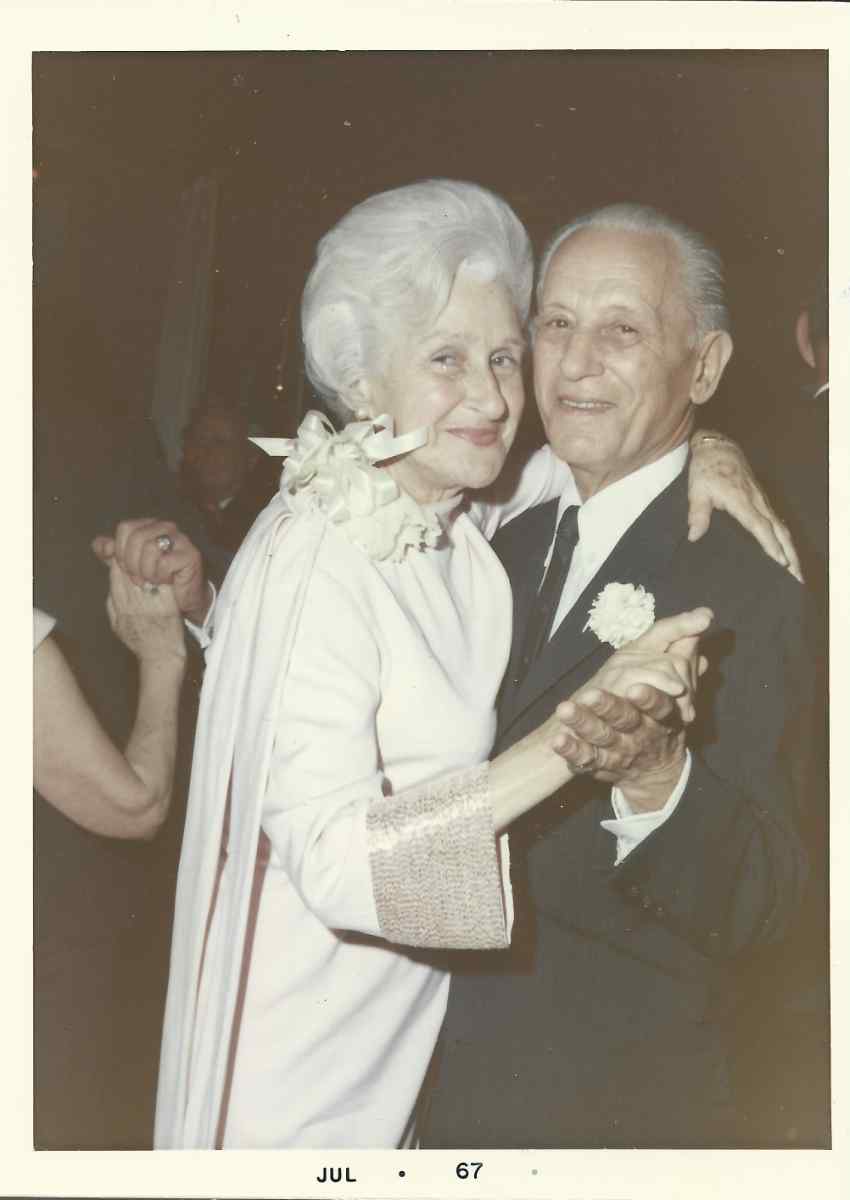
Robert Katz and Ethel Miller, dancing
Biography by Ellis Katz
This is the story of my mother and father as I knew and loved them through the years of my life. My mother was born in Chattanooga, Tenn. in 1899; my father in Odessa, Russia in 1888 but came to Chicago as an infant. They met in Chattanooga in 1917 where they were married in June of that year.
I was their only son, born in 1921, two years after my father had returned from France and World War I. My sister, Florence, the only other child, was born two years later.
My earliest memories are from the age of seven when we lived in Providence, RI. I thought my mother to be a most beautiful lady, and so she was perceived by those who knew her then and later. Her hair, which I suppose is most impressive to a little boy, was natural gold in color.
From those early years, I have little memory of my father who was a traveling salesman for the Panther Rubber Company. I do recall that we lived in a very nice apartment and had a maid, so I suppose we were reasonably well off in the later years of the twenties.
I recall with delight the presents my mother would bring home from her shopping trips. My favorites were balsa wood gliders, which may well have been the kernel of my life-long fascination and career in aerospace.
When Dad was home, my parents seemed to have led an active social life; they were, after all, a handsome well-to-do young couple during those high-life days of the late twenties.
I don't recall just how long we lived in Providence, two, perhaps, three years. From Providence, we moved to Philadelphia. The only recollection I have of Philadelphia is the fire that consumed our apartment building. Mom, for years after, would tell the story of meeting Dad at the train station with the greeting that “Everything is fine, dear, except that Florence has measles, Ellis has mumps, and our apartment building is on fire”
We were in Philadelphia only a year before moving on to Atlanta. I suppose it was about this period, early '31 that the hard times set in for Mom and Dad.
We moved into a furnished apartment on Piedmont Ave (I think 939 Piedmont). Dad continued to travel and Mom continued being the homemaker. She had the most marvelous capacity for “dressing up” a plain apartment to be warm and inviting. Mom was also a wonderful cook who always set her table groaning with delicious foods and tasty pastries. Even when times were toughest, Mom would still use several pounds of butter weekly to prepare her brownies, cinnamon rolls and other goodies.
My mother was a very good daughter to her parents who, in the '32-'35 period, lived in Atlanta on Boulevard St. I can remember her taking me and my sister to visit our Roots. I must confess that I never liked to go because they mainly spoke Yiddish and my grandfather's beard seemed so soggy when he would greet me with a kiss. Only in later years did I appreciate how kind and caring my mother's parents had been.
Mom also had a very dear sister, my Aunt Lena, and two brothers, Uncle Harry and Uncle Charlie, of whom she was very proud. Indeed, my mother's pride for her family bordered on vanity, but it was pride for her family, not for herself. Despite the fact that she was beautiful and very bright, she was in no way egocentric or vain. My grandfather died in about '36 but throughout most of the remainder of my grandmother's life, my mother cared for her and made a place for her in our home.
There was another of my mother's brothers, Ike [Miller], who became estranged from the family for reasons lost in time. I recall, however, one summer in Narraganset Pier (near Providence) when Uncle Ike and his family (I believe he had four sons, one of whose names was Teddy) visited our family, together with my Aunt Lena and Cousin Mildred, for a happy beach holiday. Later, when my mother and sister traveled to New York, they were treated very warmly by Uncle Ike and his family.
I also recall with great fondness my father's sister, Aunt Fanny, and his mother, Grandmother Katz. During the years of '32 through '34 they lived in an apartment close by my elementary school on 10th St. My Aunt Fanny taught me to drive in her Reo “Flying Cloud” which I thought was the fastest automobile on the road; what a kick! My dad also had two brothers, Uncle Irving of Memphis and Uncle Jack of Chicago. They were nice men, but it appears that Dad was not close with them, perhaps because Mom was cool to Dad's family. However, whenever Uncle Jack came to town, Mom always insisted he come for dinner and would set a spread that would have done justice to a king.
Dad, ever trying to get a few bucks ahead, was simply no match for Mom's determination to provide everything for her children. I recall how Dad would tell of the importance of saving. He would tell of how (to his mind) a postman always has a little home, a car, and would be able to send his children to college. I suppose that, to Dad, the security of a steady income in the dark days of the depression must have seemed a nirvana.
There came a time in 1932 when Dad was able to borrow some money and open, not one but two, ladies dress shops in Atlanta-on Peachtree Street as I recall. About that time, we moved to an apartment at 1015 Piedmont Ave; To me, a boy of eleven, things seemed much better. Dad was home in the evenings and even took to playing a round of golf every now and then at the Piedmont Park golf course.
I can recall, almost as though yesterday, Dad arriving home with two little puppies, one in each hand. What a joy! We named one “Brownie” and one “Blackie”. Blackie lived with us for the next twelve years as one of the family. Even when things were grim, Blackie was always able to spark a few laughs from Mom. For example, Mom would sometimes hide from Blackie who would be asked, “Where's Mom?” then Blackie would search through the rooms until she found Mom and jump with delight.
I must confess to being a very spoiled child. Of course, my mother so indulged me that I suppose I'm only partly to blame for that failing. I recall that several of my friends used their bicycles to deliver for Mr. Dennard's drug store where we kids often hung out. Mr. Dennard paid them a small pittance, but the nickel and dime tips were the real plums. One day, Mr. Dennard up and asked if I would like to deliver for him. He even offered me two dollars a week, which seemed a large sum.
After a couple of days in my new career, I noticed that Mr. Dennard was more patronizing of my welfare than he was that of my friends…asking if I would like some time off for lunch or go home early to dinner. Well, of course…it turned out that my mother was giving Mr. Dennard the two dollars for my work, but was worried that he might be working me too hard-end of new career.
The time came when the depression deepened and Dad lost both stores. He once again went on the road selling anything to make a living for his family. For a time he sold popcorn machines to movie houses. But the main way in which Dad made a living in those years was traveling through the south selling ladies' ready-to-wear dresses, suits, and coats to small retail shops. I can recall traveling with Dad in the hot muggy summers of'34 and '35 during my summer recesses. I think his car was a '32 Chevrolet; it had no radio and, of course, no air conditioner. And, in those years, auto travel in the south was not on federal expressways but along narrow dusty roads between small towns.
I so admire my father for the grind he endured to keep his family provided with what Mom had to have for her children and her table. To my knowledge, Dad never complained, but struggled in every way he knew to make ends meet. He invented a small device he called the “Dress Protektor”; it was designed to prevent lipstick from staining dresses as ladies would try them on in the shops' dressing rooms. Ron, my oldest son, has a copy of his patent disclosure in the hall of his home. Dad had his “Protektor” manufactured and sold a bunch of them to the shops he “drummed”
In the summers that I traveled with him, Dad would hit three or four small towns in a day and visit one or two shops in each town. At each place I would carry the heavy garment bags with Dad's “lines” into the shops where the owners would usually greet him with smiles and open arms. Dad would joke and share a few laughs with the owners before settling down to business and would almost always make a sale. He was an incredible salesman; he had a gift for gab and stories for all situations. I recall how, on hot summer's evenings, we often would pull into a “traveling man's” hotel where, after supper, Dad would join the other “drummers” in the lobby for the day's stories.
Things continued tough through the mid years of the thirties. We moved to another furnished apartment at 1130 Piedmont and then to 14th St between Piedmont and Peachtree. Our moves were not to fancier places, but Mom, as always, created a place of beauty and serenity wherever we found ourselves. I recall two special friends of my parents: Bob and Edith Middleman. Bob was also a traveling man and, as they had no children, Edith traveled with him. Whenever in Atlanta, they would visit us. I have the memory of a warm summer's evening on the porch of our 14 St. apartment with my parents and my sister playing Monopoly with the Middleman's; we had laughs galore.
Dad joined the Puritan Chemical Co, an Atlanta firm, in about '36. He traveled once more throughout the south selling disinfectants, cleaning goods, etc to municipalities, schools, and other public facilities. In the summer of '37 the family moved to Jacksonville, Fla for reasons I'm not sure of. I recall Dad picking us up at the Jacksonville train station in his “new” '35 Chevrolet. I was amazed at how quiet the car seemed compared to the old one and Dad telling us how traffic lanes in the city would allow passing on either side of us.
We moved into a furnished apartment at 2738 Riverside Drive. It was a nice place and within walking distance of my high school, Robert E. Lee High. But I recall that money continued to be a problem for the family. On one occasion, Dad was advanced a sum of (I think) $200 by his firm, which somehow brought relief to a trying moment in our family's life. Even to the end of the 30's, Dad was unable to accumulate any significant savings. But, as I've said earlier, Mom continued to see that her children were well fed and provided for.
With her son and daughter approaching young adulthood, Mom took a job with Purcell's, a “carriage trade” ladies shop. Things began to ease for the family and, by my high school senior year, Mom even bought furniture for a new duplex apartment on north Riverside Drive.
After war came in December 41, the family moved back to Atlanta where Dad went to work with his brother-in-law, Ben Cohen at the old Terminal (railroad) Station. Uncle Ben had, for years, owned the Brown & Alien concession stand within the station. It was a typical magazine, refreshment, and tobacco stand but, with all the servicemen passing through, it had become a gold mine. Meantime, I was at college in Gainesville, Fla and Florence had gone to work for the Railway Express Co in Atlanta. So things were much improved and my parents even joined the Progressive (social) Club.
Apartments were hard to find in Atlanta during the war years and so Mom had worked her magic on a very plain furnished apartment on Highland Ave. I recall being embarrassed to have my friends approach our apartment house, but, once inside our “home”, I was proud. Mom and Florence literally gave gallons of blood at the Red Cross and Mom also made bandages for the war effort.
Having graduated college in '43, I returned to Atlanta and the outside porch of our 2-bedroom apartment was made into my “bedroom”. I should be loath to admit that Mom would wake me for work each morning by placing warmed socks on my feet as I lay in bed. She was my Mom and there was no one like her. Dad often said, “they only made three like her, and she's all three”
The family's social life centered about the Progressive Club. I would sometimes meet Dad there after work for a couple of martinis, a lot of laughs, and a great steak. During the summer, when I worked night shifts, I would often meet Dad for lunch at Shorty's, a steak place near 5-Points in Atlanta. It was in those years that I really came to know my father as a close friend, a relationship we shared to the end.
The Progressive Club was also the place where servicemen could meet the young Atlanta belies at socials and dances, and it was there that Florence met her husband-to-be, Martin Liberman of Seattle. By June of'46 Mom, Dad and Florence were driving across the country to Seattle where Florence was married to Martin. In the meantime, I had met my wife-to-be, Marjorie Blumberg of Chattanooga. So, by July of'46, Mom and Dad had come back across the country to Chattanooga for our marriage.
With the war over, Uncle Ben and Aunt Lena moved to Charleston to be with their daughter, Mildred, and Grandma Miller came to live again with Mom and Dad. With Florence and I then on our own, Mom, Dad and Grandma moved to Miami Beach where Dad started a new chemical business. He named the business, the Alan Chemical Co, in honor of his first grandson, Alan Liberman. Mom and Dad were happy; their children were well married and they were at last financially secure.
After Grandma died in '48, Mom's overpowering maternal urges led her and Dad to pack up and move out to Seattle to be with her daughter and grandson, Alan. I must here pay another tribute to my father who always made the sacrifices called for by his family's needs. His business had prospered with the assistance of his young partner, Milton Margolis. Dad was rightfully proud of its success; he had started the business from scratch in the basement of a Miami office building.
I remember visiting his “factory”. There were shelves on which were powders, bottles, and paper goods and, on the floor, a few large steel barrels. He proudly demonstrated how he, with the assistance of their one “employee”, would mix various powders and tap water in the barrels to make up the disinfectants and cleaning soaps which he would then hand bottle to be sold as “industrial strength” cleansers. He and his partner did it all: purchasing, sales, manufacture, packaging, delivery, accounting, and janitorial. Dad loved every minute of it because it was “his baby” and it was showing a nice growing profit.
However, as I have said, Mom had to be with her daughter, so Dad did what he had to do: he sold out his partnership and started a new life in the west. I must note that Dad's young partner was so crestfallen to see him leave that he offered to continue the partnership in his absence in the hopes that Dad would return in time. It was a very generous offer but one that Dad knew could not be accepted.
So, Mom and Dad arrived in Seattle in '49 but within the year they, together with Florence, Martin, and grandson Alan, moved to Los Angeles. Mom and Dad took a furnished apartment on Dunsmuir, just off the Wilshire Miracle Mile. Dad soon landed a job as manager of a ladies dress shop in the Crenshaw district and Mom became a leading saleslady in Orbach's Oval Room.
The way Dad landed his job was typical of his pluck. He had seen the advertisement and immediately made an appointment for an interview that very day. Now, I must note that some fifteen years had passed since he had last been in the business but Dad sold the owner, who had a chain of shops, on his intimate knowledge of the trade. To seal the deal, Dad undertook to “dress” the store windows while the owner looked on with approval.
In those years, the Oval Room of Orbach's was known to cater to the wealthy and to celebrities. Many of its customers, including Loretta Young and the Gabor sisters, came to depend upon Mom's unerring good taste for their finest wear. Because she bore herself with such elegance and dressed in simple classic style, she had more customers than at times she could accommodate. Once, a customer asked if she were related to “Bobby” Katz. Mom replied that she had married him. It turned out that the customer was Dad's old flame from Toronto, Canada where he had traveled before taking a new territory in the southeast where he met Mom.
By 1955 our whole family was reunited here in LA. I had taken a job with North American and a home in Whittler. Mom and Dad would often visit us for a day on weekends. I can remember vividly how they would drive up alongside our house at 801 Penn St in their blue and white '55 Chevy and Dad would bring in a large box of all the goodies Mom had cooked and baked during the week. We had many happy family celebrations in that house: Thanksgivings, Passovers, Chanukahs and birthdays.
One of my memories is of Mom, Dad, Danny (our second son), and I standing on the grounds of the Whittler Memorial Hospital where our third son was born in Sept of 1958. Marjorie was holding newborn Paul at her window for us to see from the ground below. Mom and Dad were overcome with happiness at the birth of their fourth grandson; Mom always prided herself that she had given Paul his name.
I recall the pleasure they had from their visits to Palm Springs. They loved the sun, especially Mom, and would read for hours by the pool. In the late '50's, Palm Springs was still a quiet place -and, in the evenings, they would stroll the main street window-shopping as was the custom of all PS goers. We once had the pleasure of spending a weekend with Mom and Dad and the joy of it remains clear in my mind.
The time came when the owner of Dad's store went broke. So…at the age of about sixty-five my father became a “schoolboy”. He enrolled in a real estate course and soon had his broker's license, he joined a small firm located in the Fairfax area and was again using his extraordinary sales skills to make a living. About that time, I had taken a job with Hughes in Culver City and a home in Encino, and Mom and Dad had moved to an apartment on South Orange Grove Ave in the Fairfax area.
Orbachs had been sold and Mom turned her boundless energy to baking for her “customers” as Dad would put it. In addition to her family, Mom had friends and doctors for whom she would tend her “route”, serving up cookies and pastries by the cans full.
While with Hughes, Dad and I met weekly for lunch at a midway point between our offices. Those lunchtime chats were very special to both of us. We were never short of things to talk about; politics and the economy were our favorite subjects. And, always, lots of laughs and camaraderie. Dad was very happy in his association with his fellows at the real estate agency (I think it's name was “Town and Country”). He and his “buddies” would, when things were slow, go out back of the office and throw a baseball around-these septuagenarians all had their well-oiled gloves and prided themselves on a good throw and catch. Dad also had his special cronies whose names I cannot recall; they met each week for breakfast at Entres, a cafeteria on the Miracle Mile.
But my very special treat was dinner, usually on Wednesdays, with Mom and Dad. It was only a little out of my way home to visit with them and Mom was always prepared with the dishes I loved. We would sit in the living room and Mom would serve chopped liver and Manichewitz wine. Then celery sticks filled with cream cheese. But the piece de resistance was at her table: Mom's very own CHILI. She would serve it in large soup bowls with hot crusty bread; I can't think of it now without drooling. And it was hot! Dad always said that if your eyes and nose do not run and if you are able to sleep afterward, you aint had chili! But, believe me, we had CHILI, usually two bowls full.
It's amusing to think on the chili thing. Mom always prided herself on that special recipe, which she had got from her mother-in-law, who had lived in Fort Worth, Texas, early in her marriage. So chili became a very proprietary item in the Katz household. Whenever Dad's brothers would visit, Mom knew to have her chili on the ready. But when Marj asked her for the recipe, Mom usually found a reason she couldn't pass it on. She would say that she simply went by her taste during the preparation or some other excuse for there not being a formula. Well, of course, Mom was not about to let out the secret that bound her son to her Wednesday night dinners. It was some years later that Marj learned the secret when visiting in Memphis with my Uncle Irving's wife, Aunt Sarah. I must end this note by saying that the preparation of that special dish is very demanding and lengthy but it was Mom's labor of love to make it for me each week.
I think that some of Mom and Dad's happiest years were those they lived on South Orange Grove Ave, just a block off Fairfax Ave. Dad had completely retired and he and Mom had sufficient income to meet their very modest needs. They enjoyed their neighborhood and their long walks around the block. There were many happy family gatherings and, thank God, no debilitating illness. But the most exciting thing that happened in those years was their 50th Golden Wedding Anniversary party.
The party was held at the Beverly Hills Hotel on 3 June 1967. In addition to their friends and local family, Aunt Lena and Uncle Jack had flown in for the celebration. It was an elegant affair, Mom, and Dad looked like a million. With cocktails in the Polo Room, we recited the history of their marriage and projected old photos on a screen. Afterward, dinner was served in the ballroom where an orchestra played dance music. Mom and Dad were the focus of attention, not just of our party, but also of the other groups dining in the ballroom. When they danced to the Anniversary Waltz, everyone watched and applauded the happy couple as they twirled about the floor. It was a beautiful sight! The celebration was recorded in a photo album that, ever after, Mom proudly showed to all her friends and visitors.
One of my most vivid memories is of Thanksgiving dinners at our home in Encino. With his whole family gathered together, Dad would be at the head of the table and Mom would serve him from the buffet sideboard. Dad had a delightful wry sense of humor and his smile would brighten our festivities. As soon as dessert would be served, Mom would hand Dad his cigar, which he would enjoy with a rapture that only a cigar could bring to Dad. He would sometimes joke, “A woman is a woman, but a cigar is a cigar”.
Dad contracted diabetes when he was nearly eighty years of age. Mom, of course, watched after him exhaustively and made sure he had the proper medications and diet. The disease did not slow him down until the last year or two of his life. He died of a diabetic stroke on August 19, 1976, just a few days before his eighty-eighth birthday. Right up to the end, Dad had all his mental faculties and his great humor. He had lived a great life: his was a happy loving marriage; he provided for his family; his children and their children loved him greatly; his friends admired him; and he lived to see his children and grandchildren prosper.
For Mom, the loss of her husband was calamitous. She had drained herself physically and mentally trying to keep Dad alive when it was clear that he was failing. I recall the one time in the last several months of Dad's life that Mom relaxed a little. She agreed to go with the family to San Diego to see her grandson Alan receive his doctorate in psychology, despite the fact that Dad insisted he be left at home alone. Marjorie and I had begun to think that Dad was really tired of the struggle, and we were very fearful of what we would find when returning Mom to her apartment the next day. Happily, Dad was ok, but he passed on in his sleep just a few weeks later.
With Dad gone, Mom really let herself go. She remained in her apartment but did not eat properly and took far too many drugs. She had a couple of falls and her eccentric behavior caused her neighbors to be frightened for her. Within a few months she suffered a broken hip from which, thank God, she recovered following surgery. While she was convalescing, we urged her to give up her apartment and move into a nearby retirement hotel, the Shalom.
Mom agreed to the move but never fully forgave us, i.e., Marjorie and I, for having “taken” her out of her apartment. She was inconsolable and moved many times from one “hotel” to another before moving back to the Shalom. On one occasion we moved Mom to a very nice retirement hotel here in the Valley where she would be near her children. But she would have none of it; she longed for her familiar Fairfax neighborhood. There really was only one bright spot in Mom's life during those several years she was in the “hotels”. Two wonderful people had come into her life during one of her hospital stays. They were the Reverend Elmer and Mary Jane Ubink.
These two friends, the Reverend and Mary Jane, were a bridge for Mom to sanity. They visited her weekly, listened to her travails and did all that was possible to help her find some kind of relief. But, in the end, that relief came about through Mom's own determination to, once again, lead her own life in her own “home”
There was an apartment building just up the street from the Shalom and, as Mom would walk by it, she dreamed of having a small apartment of her own. One day, a vacancy sign appeared and it was only a short time before Mom, at the age of eighty-four, was once again on her own. I would be less than truthful to say that we were hopeful she could make it.
But, make it, she did-with the blessed help of the Freida Mohr Jewish Family Services Agency and her friends, the Ubinks. The agency saw to Mom's needs by providing in-home care and legal assistance where needed. Mom was able to prepare most of her own reasonably nutritious meals and, as she would say, “eat what she wants when she wants”
Each Saturday, Mom and I would have breakfast at the Farmer's Market where all the “regulars” came to know and admire her. Afterward, we would often go to the park where Mom would feed matzos to the pigeons. One of my special memories of the park is of a Mother's Day when, as was our custom, the whole family feted our two matriarchs, Mom and Marjorie's mother, Mother Leah. Marj gave a teddy bear to Mother Leah whose birthday also fell on that day and Mom was so enamored of it that she was brought to happy tears (aptly recorded in our photo album). Shortly after, Marj gave Mom a similar bear, which she treasured to the end of her life.
During her final two years, Mom began writing the story of her life. Each week, I would pick up several pages she had prepared and would enter them into the computer. Just before her eighty-eighth birthday, we compiled her story, “My Life” and sent copies to all her family. In her eighty-eighth year Mom passed away peacefully on April 19, 1987.
She was a most unusual person-a loving wife and mother, considerate and compassionate to all those less fortunate, a woman of boundless energy, a person who was beauty and who loved beauty. She will never be forgotten.
Ellis Katz
April 17, 1991
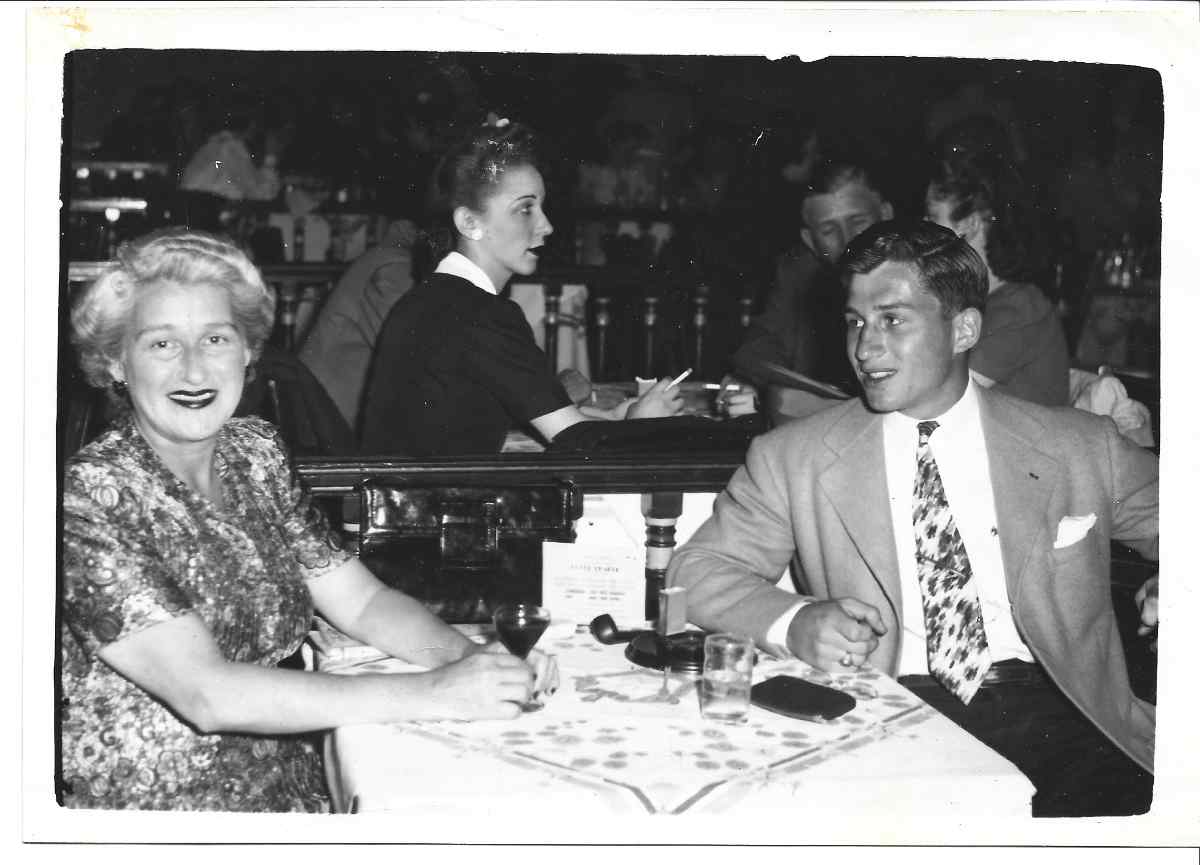
Ethel and Ellis
Extra information may be sent or requested by emailing the site administrator.